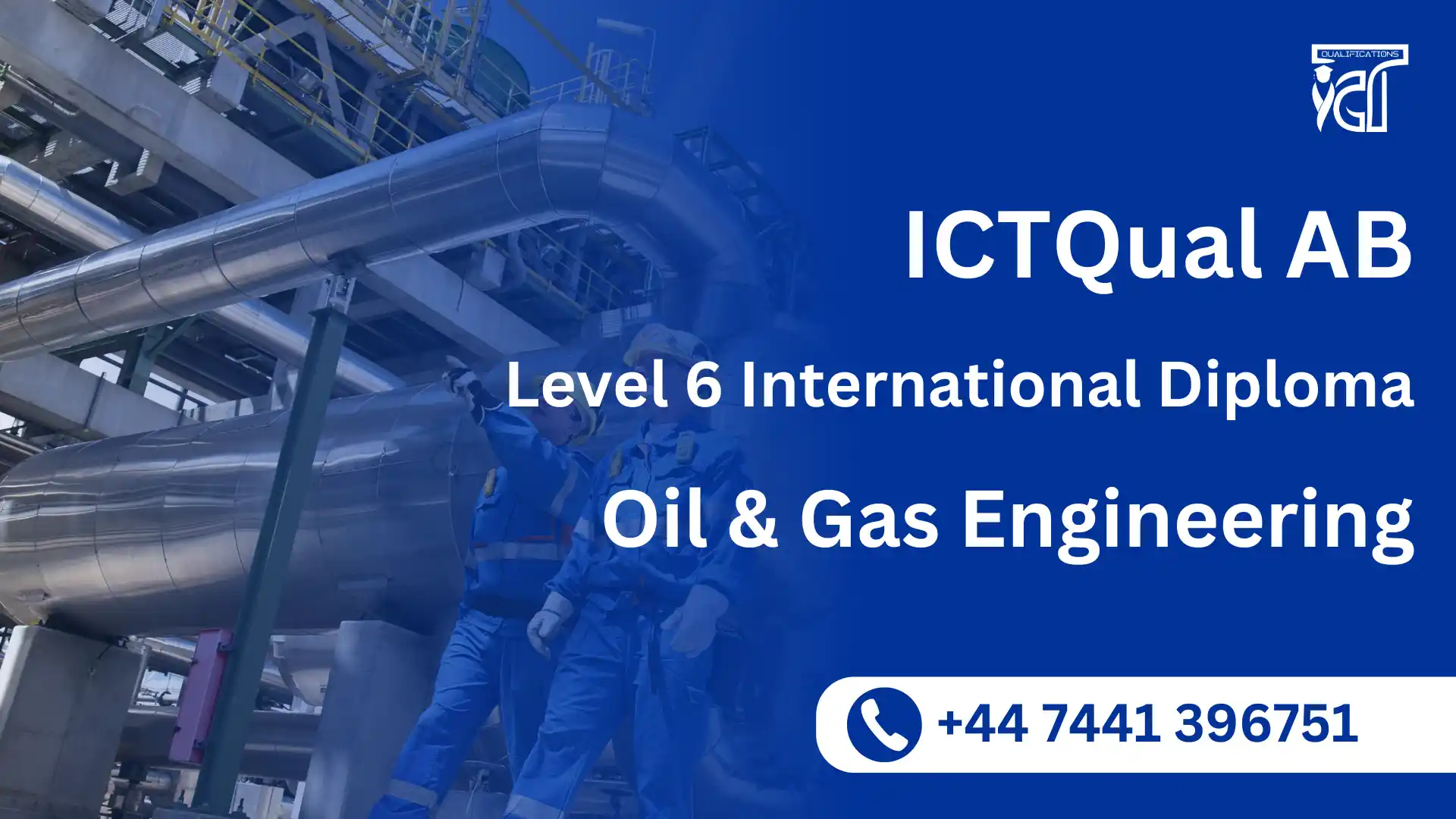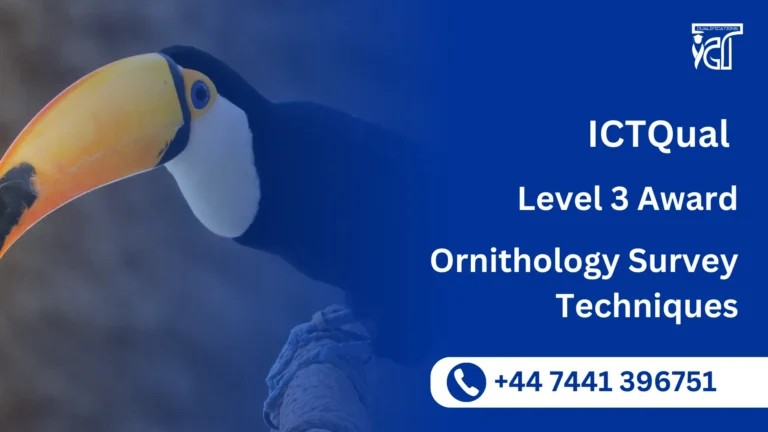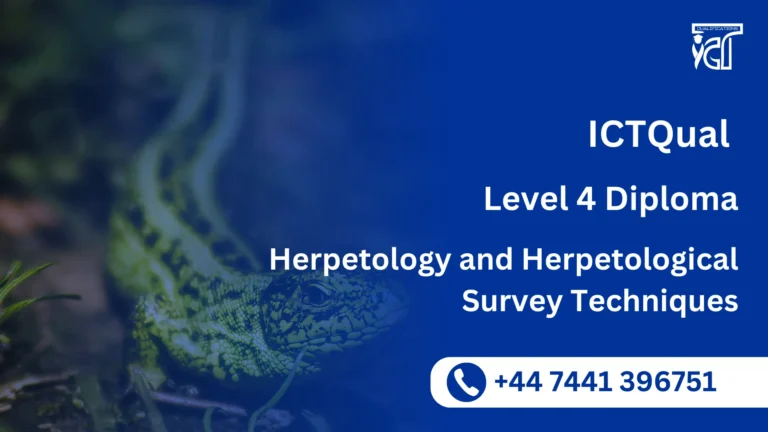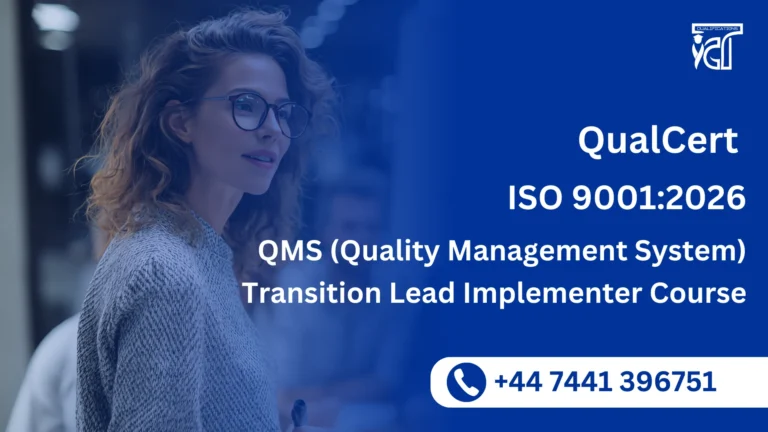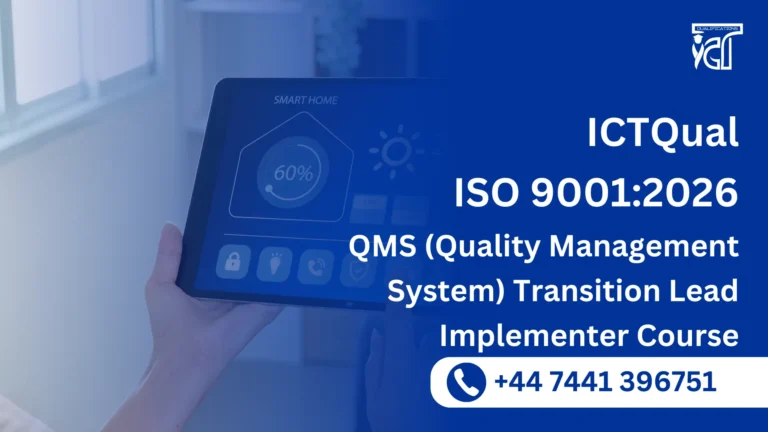The ICTQual AB Level 6 International Diploma in Oil and Gas Engineering is a comprehensive qualification tailored for learners who aspire to excel in one of the world’s most dynamic and influential industries. Designed for both freshers looking to build a strong foundation and experienced professionals seeking advanced recognition, this diploma delivers cutting-edge expertise aligned with global energy standards.
Structured over three years and carrying a 360-credit framework, the programme equips learners with essential skills in drilling operations, pipeline engineering, offshore systems, safety management, and energy resource optimisation. By blending theoretical knowledge with practical application, it prepares learners to navigate the technical, environmental, and economic challenges of the oil and gas sector.
Learners benefit from industry-focused modules that build competencies in project planning, risk assessment, and sustainable engineering practices. The course also emphasises leadership, problem-solving, and strategic decision-making, ensuring graduates are ready for high-level roles within exploration, production, and energy management.
Completing this diploma opens doors to a wide range of career opportunities across the global oil and gas value chain. Graduates can pursue positions such as Petroleum Engineer, Drilling Supervisor, Pipeline Engineer, Health and Safety Specialist, or Energy Project Manager. Whether your goal is to advance within an established organisation or to expand into consultancy and project leadership, this qualification provides the skills, confidence, and international credibility needed to succeed in today’s competitive energy market. Adaptable for diverse regions and industries, it offers a powerful stepping stone for learners committed to shaping the future of oil and gas engineering.
ICTQual AB Level 6 International Diploma in Oil and Gas Engineering
This qualification, the ICTQual AB Level 6 International Diploma in Oil and Gas Engineering, consists of 36 mandatory units.
Year 1 – Foundation in Oil and Gas Engineering
- Principles of Oil and Gas Engineering
- Introduction to Petroleum Exploration and Production
- Drilling and Well Engineering Fundamentals
- Construction Materials and Methods in Oil and Gas Projects
- Process Engineering Basics
- Project Planning and Scheduling in Oil & Gas Engineering
- Health, Safety, and Environmental Awareness in Oil and Gas
- Communication and Stakeholder Management in Energy Projects
- Digital Tools and Simulation Software in Oil and Gas
- Financial Management in Oil and Gas Projects
- Quality Assurance and Control in Engineering Operations
- Legal and Regulatory Frameworks in Oil and Gas
Year 2 – Intermediate Oil and Gas Engineering Practices
- Advanced Drilling Techniques and Well Operations
- Resource Management and Allocation in Oil and Gas Projects
- Process Design and Optimisation
- Pipeline and Infrastructure Engineering
- Procurement and Supply Chain Management in Energy Projects
- Project Risk Analysis and Mitigation
- Leadership and Team Management in Engineering Projects
- Offshore and Onshore Operations Management
- Sustainability and Environmental Management in Oil and Gas
- Project Monitoring and Reporting in Engineering Projects
- Problem-Solving and Decision-Making in Oil and Gas Projects
- Communication and Negotiation Skills in Energy Projects
Year 3 – Advanced Oil and Gas Engineering and Strategic Leadership
- Strategic Oil and Gas Project Management
- Advanced Production and Reservoir Engineering
- Energy Systems and Infrastructure Planning
- Innovation and Emerging Technologies in Oil and Gas
- Advanced Risk and Crisis Management in Engineering Projects
- Contract Management and Legal Compliance in Energy Projects
- Leadership in Oil and Gas Projects
- Advanced Project Control and Performance Measurement
- Project Governance and Compliance in Oil and Gas Operations
- Research Methods and Project Analysis in Energy Engineering
- Capstone Project in Oil and Gas Engineering
- Professional Development and Career Planning
Learning Outcomes for the ICTQual AB Level 6 International Diploma in Oil and Gas Engineering:
Year 1 – Foundation in Oil and Gas Engineering
Principles of Oil and Gas Engineering
- Understand the fundamental concepts of petroleum engineering and energy systems.
- Explore the global oil and gas industry, including upstream, midstream, and downstream sectors.
- Identify key roles, responsibilities, and career paths in oil and gas operations.
- Apply basic engineering principles to energy projects and operations.
Introduction to Petroleum Exploration and Production
- Explain exploration techniques, including seismic surveys and geological analysis.
- Understand production methods and reservoir behaviour.
- Evaluate project feasibility and resource potential.
- Identify environmental and regulatory considerations in exploration and production.
Drilling and Well Engineering Fundamentals
- Understand drilling operations, equipment, and well design principles.
- Analyse well planning, casing, and completion methods.
- Identify common drilling challenges and safety considerations.
- Apply basic calculations for wellbore design and pressure management.
Construction Materials and Methods in Oil and Gas Projects
- Describe materials used in pipelines, rigs, and facilities.
- Understand construction techniques for onshore and offshore projects.
- Assess material suitability for safety, durability, and operational efficiency.
- Apply knowledge to support project planning and execution.
Process Engineering Basics
- Understand fundamental process engineering concepts in oil and gas.
- Analyse flow systems, process operations, and unit operations.
- Apply process calculations for efficiency and safety.
- Explore process monitoring and optimisation methods.
Project Planning and Scheduling in Oil and Gas Engineering
- Develop project plans, timelines, and milestones.
- Identify task dependencies, critical paths, and resource requirements.
- Use scheduling tools for efficient project execution.
- Adjust plans to meet project objectives and deadlines.
Health, Safety, and Environmental Awareness in Oil and Gas
- Understand HSE regulations and best practices in oil and gas projects.
- Apply safety protocols in onshore and offshore operations.
- Conduct environmental impact assessments.
- Promote sustainable and safe engineering practices.
Communication and Stakeholder Management in Energy Projects
- Identify key stakeholders and their expectations.
- Communicate project information effectively using verbal, written, and visual tools.
- Manage stakeholder engagement and feedback.
- Resolve minor conflicts to support project objectives.
Digital Tools and Simulation Software in Oil and Gas
- Apply engineering software and digital tools for design, simulation, and monitoring.
- Use modelling software for process and reservoir analysis.
- Analyse data to improve operational decisions.
- Explore emerging technologies in digital oilfield management.
Financial Management in Oil and Gas Projects
- Interpret financial statements, project budgets, and cash flow reports.
- Apply cost management and investment principles.
- Monitor expenditures and identify variances.
- Support financial decision-making in energy projects.
Quality Assurance and Control in Engineering Operations
- Understand quality management principles for oil and gas projects.
- Implement quality control processes to ensure compliance and safety.
- Monitor project outputs against specifications.
- Recommend improvements for operational excellence.
Legal and Regulatory Frameworks in Oil and Gas
- Understand local and international laws governing oil and gas operations.
- Identify compliance requirements for exploration, production, and distribution.
- Apply legal knowledge to mitigate risks.
- Ensure adherence to environmental, safety, and contractual regulations.
Year 2 – Intermediate Oil and Gas Engineering Practices
Advanced Drilling Techniques and Well Operations
- Analyse complex drilling methods, including directional and offshore drilling.
- Plan well operations with risk and safety considerations.
- Optimise drilling performance and efficiency.
- Apply advanced monitoring and troubleshooting techniques.
Resource Management and Allocation in Oil & Gas Projects
- Manage human, material, and financial resources effectively.
- Analyse resource requirements and optimise allocation.
- Monitor utilisation and productivity across teams.
- Adjust resource plans to meet operational goals.
Process Design and Optimisation
- Design and evaluate process systems for oil and gas operations.
- Apply process simulations to improve efficiency and safety.
- Implement optimisation strategies for production and throughput.
- Identify bottlenecks and recommend process improvements.
Pipeline and Infrastructure Engineering
- Plan and design pipelines, storage, and transport infrastructure.
- Understand construction, maintenance, and safety protocols.
- Evaluate environmental and regulatory impacts.
- Apply engineering principles to ensure efficient and safe operations.
Procurement and Supply Chain Management in Energy Projects
- Plan procurement strategies for equipment, materials, and services.
- Manage supplier relationships and contracts.
- Optimise supply chain operations for cost, time, and quality.
- Mitigate supply chain risks in energy projects.
Project Risk Analysis and Mitigation
- Conduct comprehensive risk assessments for engineering projects.
- Develop mitigation plans for operational, financial, and environmental risks.
- Monitor risk factors and update strategies accordingly.
- Evaluate effectiveness of risk management measures.
Leadership and Team Management in Engineering Projects
- Demonstrate leadership skills in multidisciplinary teams.
- Manage team dynamics and resolve conflicts effectively.
- Motivate and guide team members to achieve project objectives.
- Promote collaboration, accountability, and high performance.
Offshore and Onshore Operations Management
- Plan, supervise, and coordinate offshore and onshore operations.
- Ensure compliance with safety, environmental, and regulatory standards.
- Monitor daily operations and performance metrics.
- Implement operational best practices to improve efficiency.
Sustainability and Environmental Management in Oil and Gas
- Apply sustainable practices in exploration, production, and processing.
- Evaluate environmental impacts and implement mitigation strategies.
- Integrate renewable energy solutions and eco-friendly technologies.
- Promote environmental responsibility in engineering decisions.
Project Monitoring and Reporting in Engineering Projects
- Track project progress against timelines, budgets, and objectives.
- Prepare clear and professional progress reports.
- Analyse data to identify delays or inefficiencies.
- Recommend corrective actions to maintain project alignment.
Problem-Solving and Decision-Making in Oil and Gas Projects
- Apply analytical techniques to resolve engineering challenges.
- Make informed decisions based on technical, financial, and operational data.
- Evaluate alternative solutions for feasibility and impact.
- Document outcomes to support continuous improvement.
Communication and Negotiation Skills in Energy Projects
- Communicate effectively with teams, contractors, and stakeholders.
- Apply negotiation strategies to achieve project objectives.
- Resolve conflicts and facilitate collaboration.
- Present technical information clearly for decision-making.
Year 3 – Advanced Oil and Gas Engineering and Strategic Leadership
Strategic Oil and Gas Project Management
- Develop long-term strategies for complex oil and gas projects.
- Align project objectives with organisational and market goals.
- Evaluate operational, financial, and technical factors for decision-making.
- Apply strategic planning to optimise resource use and project outcomes.
Advanced Production and Reservoir Engineering
- Analyse reservoir behaviour and optimise production methods.
- Apply enhanced oil recovery techniques and production modelling.
- Evaluate production efficiency and operational performance.
- Implement strategies for maximising resource extraction.
Energy Systems and Infrastructure Planning
- Design and manage energy infrastructure for oil and gas projects.
- Integrate power, transport, and pipeline systems for efficiency.
- Address technical, logistical, and environmental challenges.
- Plan infrastructure investments and operations for long-term sustainability.
Innovation and Emerging Technologies in Oil and Gas
- Explore emerging technologies such as digital oilfields, IoT, and automation.
- Evaluate innovative solutions to improve efficiency and safety.
- Apply technology to process optimisation and project management.
- Assess feasibility, ROI, and operational impact of new technologies.
Advanced Risk and Crisis Management in Engineering Projects
- Conduct high-level risk assessments for strategic oil and gas operations.
- Develop contingency and crisis management plans.
- Respond effectively to operational emergencies and disruptions.
- Evaluate risk strategies and refine procedures for continuous improvement.
Contract Management and Legal Compliance in Energy Projects
- Administer contracts and agreements for large-scale projects.
- Ensure adherence to legal, regulatory, and contractual requirements.
- Mitigate risks related to leases, procurement, and service contracts.
- Resolve contractual disputes professionally.
Leadership in Oil and Gas Projects
- Lead multidisciplinary teams in complex projects.
- Foster accountability, collaboration, and ethical practices.
- Mentor and develop team members for professional growth.
- Promote organisational objectives through effective leadership.
Advanced Project Control and Performance Measurement
- Monitor project performance using advanced KPIs and control systems.
- Analyse operational, financial, and technical metrics.
- Implement corrective measures to ensure project alignment.
- Prepare detailed performance reports for stakeholders and investors.
Project Governance and Compliance in Oil and Gas Operations
- Apply governance frameworks to ensure transparency and accountability.
- Maintain compliance with statutory, regulatory, and organisational standards.
- Establish monitoring and reporting mechanisms.
- Review and improve governance practices for operational excellence.
Research Methods and Project Analysis in Energy Engineering
- Conduct research to support evidence-based engineering decisions.
- Analyse technical, financial, and operational data.
- Apply statistical and analytical tools for problem-solving.
- Present research findings in professional reports or presentations.
Capstone Project in Oil and Gas Engineering
- Integrate knowledge and skills from all course units into a practical project.
- Demonstrate competence in planning, execution, and management of oil and gas operations.
- Apply leadership, risk management, and innovation to solve real-world challenges.
- Produce a professional report and presentation of project outcomes.
Professional Development and Career Planning
- Develop a personal career plan aligned with oil and gas engineering.
- Identify opportunities for professional growth and continuous learning.
- Build networking, leadership, and strategic decision-making skills.
- Prepare for senior roles in petroleum engineering, project management, and energy consultancy.
The ICTQual AB Level 6 International Diploma in Oil and Gas Engineering offers learners a comprehensive pathway to excel in one of the world’s most vital industries. Combining advanced technical knowledge with practical, industry-relevant skills, this qualification provides a solid foundation for both career starters and experienced professionals aiming for leadership roles in energy engineering and resource management.
1. Professional Recognition and Industry Credibility
- Earn a globally recognised qualification respected across the oil and gas sector.
- Build credibility with employers, clients, and professional networks.
- Strengthen your profile for senior or specialist engineering roles.
2. Advanced Technical and Management Skills
- Gain expertise in drilling operations, pipeline engineering, offshore systems, and resource optimisation.
- Develop strong competencies in risk assessment, safety management, and sustainable energy practices.
- Enhance project management, leadership, and decision-making skills for complex engineering challenges.
3. Enhanced Career Opportunities
- Qualify for roles such as Petroleum Engineer, Drilling Supervisor, Pipeline Engineer, HSE Specialist, or Energy Project Manager.
- Access opportunities within multinational oil companies, engineering firms, and consultancy agencies.
- Increase earning potential and competitiveness in global energy markets.
4. Practical, Industry-Focused Learning
- Engage with real-world case studies and assignments reflecting current industry standards.
- Develop hands-on problem-solving abilities to handle dynamic field conditions.
- Benefit from tutor guidance and resources tailored for practical application.
5. Pathway for Long-Term Career Growth
- Progress to Level 7 Diplomas or postgraduate studies in oil and gas engineering or energy management.
- Lay the groundwork for starting your own consultancy or engineering practice.
- Stay ahead of industry trends with knowledge in sustainable energy and smart technologies.
The ICTQual AB Level 6 International Diploma in Oil and Gas Engineering is designed for motivated learners eager to thrive in the global energy sector. It caters to fresh candidates looking to establish their careers and experienced professionals aiming to enhance their expertise and credibility.
1. Fresh Graduates and Career Starters
- Learners with a background or interest in engineering, energy, or related technical fields.
- Individuals seeking foundational knowledge and practical skills to enter the oil and gas industry.
- Those looking to gain an internationally recognised qualification to boost employability.
2. Experienced Professionals
- Learners with 6+ years of verifiable experience in oil and gas operations, pipeline engineering, offshore systems, or related areas.
- Professionals aiming to formalise their expertise and fast-track career advancement through a recognised diploma.
- Those preparing for senior positions such as Drilling Supervisor, Energy Project Manager, or Operations Lead.
3. Aspiring Leaders and Specialists
- Learners interested in advancing into management, consultancy, or specialist engineering roles.
- Individuals who want to develop leadership, strategic planning, and problem-solving skills for complex projects.
- Professionals seeking opportunities in international oil and gas markets.
4. Globally Minded Learners
- Learners targeting global career opportunities across exploration, production, and energy management.
- Those eager to contribute to sustainable energy solutions and innovative oil and gas practices.
- Individuals committed to completing a three-year, 360-credit programme to achieve long-term professional success.
Completing the ICTQual AB Level 6 International Diploma in Oil and Gas Engineering opens a world of advanced opportunities for learners aiming to build a long-term career in the global energy sector. This qualification provides both academic progression and professional growth pathways tailored to an industry that demands innovation, leadership, and technical expertise.
1. Academic Advancement
- Progress to Level 7 Diplomas or equivalent postgraduate qualifications in oil and gas engineering, petroleum technology, or energy management.
- Pursue a Master’s degree (MSc or MBA) in energy engineering, offshore technology, or related fields to deepen specialist knowledge.
- Explore further specialisation in areas such as sustainable energy systems, drilling technologies, or subsea engineering.
2. Professional Career Growth
- Qualify for advanced roles like Petroleum Engineer, Drilling Supervisor, Pipeline Engineer, HSE Manager, or Energy Project Director.
- Gain access to international projects and high-responsibility positions within multinational oil companies and engineering consultancies.
- Increase earning potential and eligibility for strategic or executive-level positions.
3. Professional Certifications and Memberships
- Use this diploma as a stepping stone toward certifications or memberships in recognised engineering and energy associations.
- Strengthen your profile with credentials that enhance credibility and employability in competitive markets.
4. Entrepreneurial and Consultancy Opportunities
- Launch your own oil and gas engineering consultancy or project management firm.
- Provide expert advisory services to organisations on energy projects, safety compliance, and sustainable practices.
This diploma ensures learners are prepared for global recognition, long-term career growth, and leadership roles in the dynamic oil and gas industry.
As an approved centre of ICTQual AB, we provide two clear certification pathways to ensure that every learner can achieve this prestigious qualification based on their background and expertise:
1. Route for Experienced Professionals
- Designed for professionals with a minimum of 6 years of verifiable experience in the oil and gas or related engineering fields.
- Learners on this route can use their practical expertise and industry knowledge to meet assessment requirements efficiently.
- This pathway recognises professional achievements and accelerates the certification process for qualified candidates.
2. Route for Fresh Candidates
- Ideal for learners who are new to the oil and gas industry or have limited experience.
- Fresh candidates are required to complete 36 structured assignments covering all critical modules and competencies within the programme.
- This ensures a comprehensive understanding of oil and gas engineering concepts, practical applications, and industry standards.
By enrolling with us, learners gain access to expert guidance, high-quality learning resources, and dedicated support throughout their certification journey. Whether you are an experienced professional or a fresh candidate, our approved centre ensures you receive the knowledge and recognition needed to excel in the global oil and gas engineering sector. the competitive global property market.
Entry Requirements
To enrol in the ICTQual AB Level 6 International Diploma in Oil and Gas Engineering, learners must meet the following requirements to ensure they are prepared for this advanced programme:
1. Minimum Age
- Learners must be at least 18 years old at the time of enrolment.
2. Educational Background
- A Level 5 Diploma or equivalent qualification in Engineering, Oil & Gas, Mechanical, Petroleum, or a related discipline.
- Alternatively, a Bachelor’s degree (or equivalent) in a relevant engineering or technical field.
3. Professional Experience
- Certification Route 1 (Experienced Professionals): Minimum 6 years of verifiable industry experience in oil & gas engineering, petroleum operations, or related fields.
- Certification Route 2 (Fresh Candidates): No formal work experience required, but candidates must complete 36 mandatory assignments/projects during the course.
4. Language Proficiency
- Competence in English is required to understand technical materials and assessments.
- Recommended standards: IELTS 5.5 or equivalent. Applicants who completed prior education or work experience in English-speaking environments may be exempt.
Register Now
Qualification Process
Qualification Process for the ICTQual AB Level 6 International Diploma in Oil and Gas Engineering
- Self-Assessment:
Begin by evaluating your eligibility to ensure you meet the qualification requirements, including work experience, knowledge, and language proficiency. - Registration:
Complete your registration by submitting the required documents, including a scanned copy of a valid ID, and paying the registration fee. - Induction:
An assessor will conduct an induction to confirm your eligibility for the course and explain the evidence requirements. If you do not meet the criteria, your registration will be cancelled, and the fee will be refunded. - Assignments & Evidence Submission:
Provide all assignments and the necessary evidence based on the assessment criteria outlined in the course. If you are unsure of the required evidence, consult with the assessor for guidance on the type and nature of evidence needed. - Feedback and Revision:
The assessor will review your submitted evidence and provide feedback. Evidence that meets the criteria will be marked as “Criteria Met,” while any gaps will be identified. You will be asked to revise and resubmit if needed. - Competence Evidence:
Submit final evidence demonstrating that all learning outcomes have been met. This evidence will be marked as “Criteria Met” by the assessor once it is satisfactory. - Internal Quality Assurance (IQA):
The Internal Quality Assurance Verifier (IQA) will review your evidence to ensure consistency, quality, and compliance with standards. - External Verification:
The IQA will submit your portfolio to ICTQUAL AB External Quality Assurance Verifiers (EQA) for final confirmation. The EQA may contact you directly to verify the authenticity of your evidence. - Certification:
Upon successful completion of all checks, ICTQUAL AB will issue your official certificate, confirming that you have attained the ICTQual AB Level 6 International Diploma in Oil and Gas Engineering.

